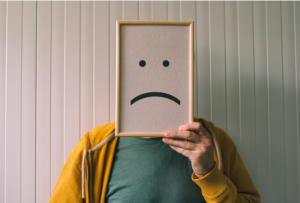
Associated Emotions
Powerful emotions are part of the grieving process. You may need to deal with these before you can progress through your grief. There are general ways to cope, such as talking with sympathetic friends, loved ones, or others who are also grieving, attending support groups, or reading books or listening to recorded material designed for this purpose. In many cases there may be specific ways to help relieve or channel certain emotions or feelings.
Fear
Fear is often the result of the unknown. It can hinder you or motivate you, depending on how you respond to it. Even if you are not afraid to die, there are other anxieties that are associated with dying, including:
- Where you might die;
- Dying alone;
- Suffering, pain and loss of self-control;
- Becoming a burden to loved ones;
- Fearing that life had no purpose or meaning; and/or
- Fearing you will lose your self-image.
 In some cases acknowledging what you fear can help you face and manage it.
In some cases acknowledging what you fear can help you face and manage it.
- If you’re afraid of being alone, share this with your family and loved ones so they can try to always have someone with you or close to you.
- Arrange for hospice or other palliative care.
- Decide where you would like to die, make your wishes known, and make it happen. Hospice will help you.
- Share your life with family and friends, which will affirm that your life has meaning and help you maintain your self-image.
Anger
Anger is another powerful emotion. Even if you do not fear death, you may not feel ready to die and feel angry about it, especially if it is earlier than you expected and you think of all the things you will miss.
Anger is frequently a result of frustration, anxiety, loneliness, or uncertainty. It may be associated with agitation, weakness, crying, aimless or disorganized activities, envy at seeing others with their loved ones, or preoccupation with thoughts about life not being fair. It’s natural to be upset when you feel life has been unfair to you, but consider carefully what or who you are angry at.
- It is human nature to take your anger out on those around you, even if they are not the cause. Even if you are sure they will accept it and forgive you for it, it can be harmful to treat those you need the most support from this way.
- While it is healthy to express your anger toward life, your illness, or your situation, use it in a positive way to motivate yourself to solve problems and take action to get what you need.
Guilt and Regret
Life doesn’t always go how we want, so it is not uncommon for you to have regrets or feel guilty about things you have or have not done or said. You may feel you have not met your own or someone else’s expectations.
If you have these feelings, dwelling on your regrets and guilt is not helpful and may make acceptance more difficult. This is a time you must try to look forward by forgiving yourself and others, improving relationships, and controlling the things you can.
 Anxiety and Depression
Anxiety and Depression
Depression and anxiety are not always a psychological condition, but a normal emotional reaction to loss. They are common and can be exceptionally profound while you or loved ones are approaching the end of life.
- Depression and anxiety may come and go throughout the process and is usually the result of feeling overwhelmed and helpless.
- You may feel some or all of the emotional and physical signs of depression.
- It is common to have the symptoms and not realize you are depressed and/or anxious until reflection.
- Unlike the previously listed emotions, these feelings may become psychological diagnoses if too severe.
Although the line between typical depression due to grief and clinical depression may be difficult to recognize, it is important to know if you have crossed it. These are symptoms that suggest clinical /major depression.
Feeling Alone
When you initially accept your diagnosis, it is easy to feel that you are going through this alone, but your family and friends can offer support through difficult times. Do not isolate yourself from life or your family and friends, even if you feel this.
Maintaining a connection with your loved ones and making new connections to others in a similar situation are the best way to prevent the loneliness that can come with an end-of-life experience.
Seeking Meaning
Like many life-altering situations, it is common for an end-of-life experience to result in a re-examination of your life. You may look for those things in life that meant the most to you or gave the greatest sense of joy and accomplishment. This may be a fond reminiscing of your life, self-reflection, or spiritual quests or you may use your discoveries to guide your remaining days
You may want to spend most of your time on those things, such as family or work, to make these remaining days more fulfilling. You may want to use the time to make contributions to those activities so they will be preserved after your death.
